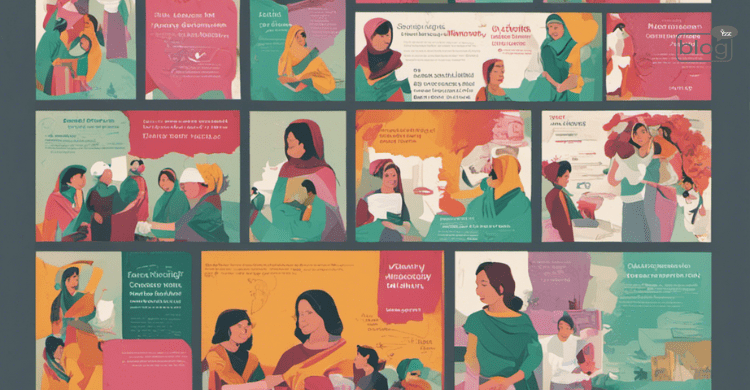Women in Bangladesh encounter obstacles that impede their overall well-being and quality of life. However, prioritizing the empowerment of women in healthcare is not only a matter of ethics but also a practical approach that generates favorable social and economic results. By directing resources towards the improvement of women’s health we can initiate a chain reaction that brings about changes within communities and guarantees a brighter future for everyone. This article will delve into the health hurdles confronted by women, in Bangladesh and shed light on the significance of initiatives aimed at empowering them.
Key Health Challenges Faced by Women
Women in Bangladesh encounter a multitude of health obstacles that impede their capacity to live satisfying lives. The significant rates of mortality, restricted availability of reproductive healthcare, violence based on gender, malnutrition, and insufficient knowledge about preventive measures are only a handful of the problems afflicting women in this nation. These challenges not only impact individual women but also have extensive repercussions for families, communities, and the entire country, as a whole.
Importance of Empowering Women in Health
Promoting the physical, mental, and social well-being of women is a stride in attaining gender parity and fostering sustainable progress. When women are healthy. They can actively engage in their communities, pursue education, find meaningful work, and contribute to the economy. Furthermore, investing in women’s health yields benefits such as poverty reduction, enhanced child well-being, improved access to education, and strengthened social cohesion. It serves as a driving force for advancement. It paved the way for a brighter future for Bangladesh.
Current Landscape of Women’s Health Initiatives in Bangladesh
Recognizing the significance of women’s health both governmental bodies and non-governmental organizations (NGOs) have implemented a range of measures to cater to the healthcare requirements of women, in Bangladesh.
Government Initiatives
The government of Bangladesh has put in place healthcare policies and programs to enhance the health outcomes of women. These initiatives comprise the National Health Policy, the Health, Population, and Nutrition Sector Development Program, and the National Plan of Action, for Nutrition 2016 2025. These policies give priority to addressing women’s health issues and ensure that resources are allocated to offer affordable healthcare services.
Moreover, the government has been actively dedicated to improving the availability and affordability of healthcare services for women throughout the nation. Initiatives such as the Essential Service Package, which grants reproductive healthcare services and the Health Protection Scheme, which provides financial aid, for medical treatment have effectively addressed monetary obstacles and ensured that women can obtain necessary care.
Non-Governmental Organizations (NGOs) Efforts
NGOs play a role in tackling the health issues faced by women in Bangladesh. They work diligently to fill the gaps, in healthcare services and create solutions that cater to the specific requirements of women.
In Bangladesh, NGOs have actively worked towards creating awareness about women’s health providing reproductive healthcare services advocating for women’s rights, and offering healthcare through clinics that reach remote areas. Their dedicated work has had an impact, on marginalized communities empowering women to take control of their well-being.
Innovations and Technologies Driving Change
In Bangladesh, the field of women’s health is transforming due to groundbreaking innovations and technological advancements. These progressions are making it easier for women to avail of healthcare services fostering opportunities and empowering them to make well-informed choices regarding their well-being.
Digital Health Solutions
Telemedicine has proven to be an advancement in the field of women’s healthcare. By utilizing telemedicine platforms women can conveniently connect with healthcare professionals from a distance thereby saving time and expenses that would otherwise be incurred through long-distance travel, for medical consultations. This technology has particularly benefited women in rural areas who lack access to specialized healthcare services.
Mobile applications addressing specific health concerns have also gained popularity. Apps focusing on reproductive health, menstrual health, nutrition, and mental well-being provide women with personalized information, tracking tools, and reminders, empowering them to take control of their health journey.
Women-Centric Health Programs
Health programs that prioritize women have played a role in addressing the specific healthcare requirements of women in Bangladesh. They have focused on reproductive health education and services to raise awareness, about contraception, family planning, transmitted infections, and safe abortion. By offering information and services these initiatives empower women to make well-informed choices regarding their reproductive health.
Improving the health outcomes of women in Bangladesh has been greatly influenced by interventions related to child health. Initiatives targeting care, professional assistance during childbirth postnatal care, and immunization have made significant contributions toward lowering mortality rates for both mothers and children. These initiatives are laying the foundation for a future that benefits both women and their families.
Promoting women’s well-being is a stride towards attaining gender equality and sustainable development, in Bangladesh. The combined efforts of the government, non-governmental organizations (NGOs) cutting-edge technologies, and health programs specifically designed for women have resulted in advancements in addressing the various health issues that women encounter. The success stories of resilient women and the promising prospects underscore the transformative power of empowering women in health. Let us continue to support and advocate for women’s health in Bangladesh, creating a society where every woman can thrive and contribute to the well-being of their communities.
To read more blogs like this, click here
Writer,
K.M. Asif Rahmotullah
Intern
Content Writing Department,
YSSE

